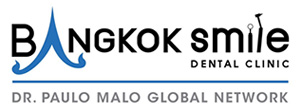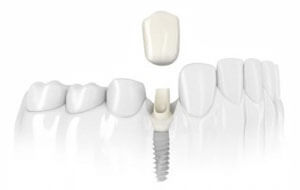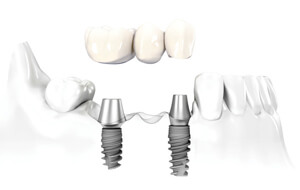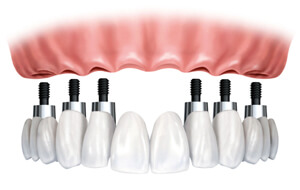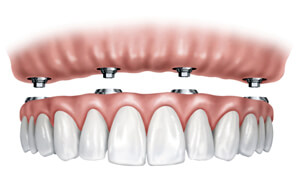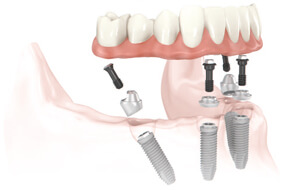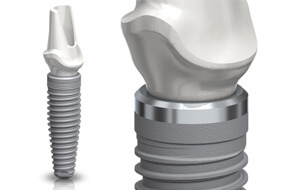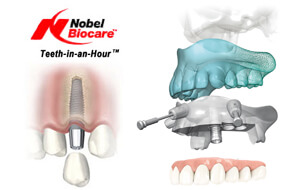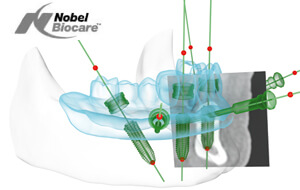
Implant Unit Placement (Surgical Phase)
How is the procedure done?
At present, implant placement is commonly carried out in one stage. This method has simplified the procedure for both patients and dentists/oral surgeons. However, not all patients are suitable for this method; your oral surgeon will advise you accordingly with this matter.
- Single-Stage Treatment
- This involves placement of the titanium implant within in the jaw bone. Local anaesthetic will be given to numb the area where the implant is to be placed. A small incision is made in the gums to expose the underlying jaw bone and bone is then prepared to receive the implant. This has to be carried out gently to ensure bone vitality and to maximize success. During this process, you will feel some vibration, similar to that of having a tooth filled. Subsequently, the implant is inserted into the prepared site. The gums are then repositioned and held in place with sutures around the implant, exposing apportion of the implant in the month.
- Two-Stage Treatment
- It is occasionally necessary to stage the implant placement in two parts. This is done for various reasons, usually if the area to receive the implant is sub-optimal, or the treatment is more complex.
- The procedure is identical to that of the single stage surgery, except that the gums are closed completely over that implant. The implant is then left to adhere to the bone for a period of there to six months, depending on the quality of the bone. During the healing period, a provisional prosthesis may be fabricated, if desired, until the permanent prosthesis is issued. When the healing is complete, a small incision is then made to expose the implant and the gums repositioned around the implant. The restorative process is then similar for both the single-stage and two-stage techniques.
In what situation would a bone augmentation procedure be necessary?
Depending on your condition, additional bone augmentation procedure may be necessary prior to the implant placement. A key to implant success is the quantity and quality of the bone where the implant is to be placed. Over a period of time, the jawbone associated with missing teeth atrophies or is resorbed. This often leaves a condition in which there is poor quality and quantity of bone suitable for the placement of dental implants.
- Sinus-lift Procedure
- The back part of the upper jaw has traditionally been one of the most difficult areas to successfully place dental implant due to insufficient bone quantity and quality and the close proximity to the maxillary sinus. A sinus lift procedure involves elevating the sinus floor, Sinus augmentation has been shown to greatly increase your chances for successful lasting implants.
- Ridge-Augmentation
- In severe case, the jaw bone has resorbed so much that it is impossible to place an implant fixture. A "bone graft" is necessary to necessary to increase ridge height and/or width.
These procedures may be performed separately or together, depending upon the individual’s condition. There are several areas of the body which are suitable for obtaining bone for grafting. Bone grafts can be taken from inside the mouth, in the area of the chin or third molar (wisdom tooth) region or in the upper jaw behind the last tooth. Additional sources of bone may also be obtained from animals or synthetic materials.
Will the implant placement procedure be painful?
The discomfort experience after the placement of implants is generally equivalent to that experience from an extraction of a tooth.
Most implants are placed using local anaesthetic only. Sedation may be used with more apprehensive patients, and in some cases where extensive surgery is required, a general anaesthetic may be recommended.
What precautions should I take before surgery?
Before or after the surger,y you may be asked to take oral antibiotics and use antiseptic mouthwash. You will also be asked to brush your teeth carefully the morning of your surgery. If you smoke, you should stop smoking at least two weeks before the surgery, as smoking has been shown to significantly decrease the success rate of an implant placement procedure.
What happens after surgery?
As with all surgical procedures, there may be mild discomfort and swelling. An ice-pack help to you face will reduce the swelling. The medication prescribed should adequately control the pain.
The first day after the surgery, you may drink liquids and start a soft diet. Take your antibiotics and pain medications as prescribed and continue to use ice-packs and gauze as needed. Proper home care with frequent rinsing helps prevent infection and assists the healing process. Tooth brushing should commence although the surgical area should be avoided for the first two weeks.
The sutures are removed one to two weeks after the surgery. At two weeks you will be asked to clean your mouth with a soft-bristled toothbrush to prevent plaque build-up.
When can I resume my normal activities?
Most people return to work within a day or two of surgery. One to two weeks after surgery, your old dentures may be relined to ensure a better fit.
You can then wear your dentures, which may have to be adjusted during the healing period. Should any soreness develop, be sure to contact your dentist who will relieve the pressure under your dentures.
